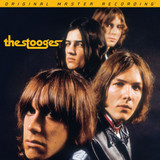Catchy Hooks, Rhapsodic Melodies, Symphonic Bluster, and Meticulous Production
Supertramp's Breakfast in America has it all: Illustrious artwork. Sing-a-long hooks. Contagious melodies. Symphonic bluster. Rhapsodic thrust. Signature Wurlitzer electric piano sounds. Two Grammy Awards, including one for Best Engineered Album. More than 20 million copies sold. Four Billboard hit singles that continue to dominate radio airplay today. Every aspect of the chart-topping art-rock set screams blockbuster, not the least of which is the production, the result of painstaking studio setups and months of mixing. Now, you can experience the sonic brilliance in unprecedented clarity on Mobile Fidelity's definitive-sounding reissue.
Mastered from the original master tapes, this numbered-edition hybrid SACD wrings out the record's dynamics, colors, and tones in all their full-range glory. Absent artificial ceilings, Breakfast in America unfolds with an expansiveness and radiance that parallels the vibrancy of its iconic New York-themed cover. Crucial traits such as imaging, separation, balance, transients, and openness achieve near-epic levels of realism and presence. Songs unfold and breathe on mammoth soundstages that put the effort's legendary production – and stellar playing – into proper perspective. The 1979 set has been reissued multiple times in the past, but it's never sounded so engaging, lifelike, or entertaining.
Indeed, aside from the undeniably catchy nature of the ten tracks, fun remains the most central element of Breakfast in America. The band even titled the record to fall in line with the overall joyful feeling of the material. About the latter: Few late 1970s rock albums feature a more cohesive, harmony-drenched parade of stunningly executed, wondrously arranged works. The collective offspring of members Rick Davies and Roger Hodgson, each tune reflects the creative pulses of each musician, with the resultant contrasts lending to their appeal. Davies' penchant for grittier, bluesy strands blends with Hodgson's witty, pop-leaning techniques. The combination proves unstoppable.
Home to a quartet of commercial staples – "The Logical Song," "Goodbye Stranger," "Take the Long Way Home," and the title track – Breakfast in America teems with arena-sized drama, meticulous craftsmanship, and mesmerizing refrains. Shrewd lyrical turns abound, whether on the phonetic, adjective-stacked "The Logical Song," life-in-America portrait "Child of Vision," or move-to-L.A. saga "Gone Hollywood." U.S. references also dot the smash title track, which reflects the glib humor, romantic fantasies, and pop culture permeating the record.
Breakfast in America also retains its vitality because of its expert instrumentation and placement. Deemed a "a textbook-perfect album of post-Beatles, keyboard-centered English art rock that strikes the shrewdest possible balance between quasi-symphonic classicism and rock & roll" by Rolling Stone shortly after its release, the record serves as a blueprint of reference-setting production and mixing. Check the scorching guitar outro on "Goodbye Stranger," gospel accents on "Lord Is It Mine," saxophone lines on "Take the Long Way Home," or chemistry of the choruses on basically every piece here. It's enough to make one long for the 70s again.
- Gone Hollywood
- The Logical Song
- Goodbye Stranger
- Breakfast in America
- Oh Darling
- Take the Long Way Home
- Lord is it Mine
- Just Another Nervous Wreck
- Casual Conversations
- Child of Vision







